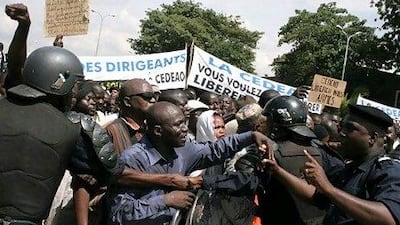Mali's beleaguered interim government is warning of a "race against time" to defeat Islamist rebels controlling the north of the country after an international summit failed to produce clear plans for military intervention.
The UN Security Council has set a 45-day deadline, expiring in late November, for a "specific" plan for action to end a crisis that threatens to spread beyond the West African state.
But after the meeting of Africa, UN and European delegates in Mali's capital Bamako on Friday, the timing of any use of force - and the enthusiasm of some neighbouring countries for such intervention - remains uncertain.
The summit took place amid growing concern about systematic rights abuses alleged to have been carried out by rebels linked to Al Qaeda.
EU leaders meeting separately in Brussels said the crisis presented "an immediate threat to the Sahel region as well as to West and North Africa and to Europe". A statement promised support for Mali's efforts to restore the rule of law.
A military coup in March, following government failures to deal with unrest by Tuareg separatists, drove president Amadou Toumani Touré from power. The Tuareg rebels have since seen their revolt effectively hijacked by Islamists from the Movement for Oneness and Jihad in West Africa (MOJWA) and Ansar Dine (or "defenders of the faith"), both with ties to Al Qaeda's North African arm (AQIM).
After widespread condemnation of the March coup, the military junta stepped aside and an interim government was installed with Dioncounda Traoré, speaker of the Malian parliament, as president.
Mr Traoré said on Friday of the need to dislodge the rebels: "We must not lose a single second. This is an emergency, a race against time."
But there is no sign of the Islamists' grip weakening in the north of the country.
There have been reports of summary executions, amputations and public floggings as the Islamists enforce a rigid interpretation of Sharia.
In one incident, Ansar Dine forces controlling the northern city of Timbuktu reportedly ordered a 15-year-old girl to receive 60 lashes for talking to men in the street.
Rebels have also destroyed tombs and shrines, claiming the attacks on cultural heritage sites are designed to preserve the integrity of Islam by preventing the worship of idols.
Islamists have threatened to murder French hostages as a reprisal for France's push, as the former colonial power, for UN-supported use of force. Six French nationals are held in the region.
The French president, François Hollande, supports intervention by West African troops with France supplying logistical and financial assistance but not soldiers.
During his African visit earlier this month, Mr Hollande was warned by the rebels that he was a target, too.
However, the threats have not shaken France's resolve.
The French defence minister, Jean-Yves Le Drian, said last week that intervention was weeks rather than months away.
Nkosazana Dlamini-Zuma, who chairs the African Union Commission (AUC), said in Bamako that there was a strong desire to see Mali return to its "original democratic, united and developing country" status.
Ms Zuma, the first woman to head the AUC, said the organisation wanted to work with Malian authorities, the UN and the Economic Community of West African States (Ecowas) to restore Mali's "territorial integrity" and plan for post-conflict elections.
In a statement, summit delegates insisted the meeting had given the international community an occasion to restore "the constitutional order, national unity and territorial integrity of Mali".
But observers said they failed to resolve differences on dealing with political chaos on the south and the rebel takeover in the north.
Delegates called for sanctions against "terrorist networks" and Malian rebels linked to them. But divisions remain between hawks demanding military action and those seeking a negotiated settlement
There is not even consensus on whether promised elections should take place before or after any military operation. Mr Traoré's position, reaffirmed on Friday by his foreign minister, Tieman Hubert Coulibaly, is to oppose voting as long as occupation of the north continues.
Among neighbours, Algeria - the region's major military power - prefers to explore diplomatic solutions while the Guinean president, Alpha Conde, argues that there is no option to the use of force.
Some UN officials, US diplomats and military officials have joined Algerian sceptics and some rights groups in warning against "ill-prepared" and potentially catastrophic intervention.
* With additional reporting by Agence France-Presse and Reuters


